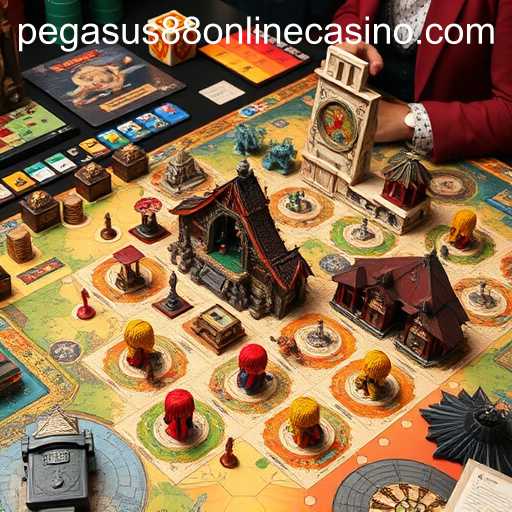Tabletop Games: A Rich World of Strategy and Imagination
The world of tabletop games is vast, colorful, and constantly evolving. From classic board games like Monopoly and Chess to the modern complexity of games such as Pandemic and Gloomhaven, there is something in this realm for every type of player. Tabletop games offer a unique experience that combines strategic depth, social interaction, and intellectual challenge. In recent years, the intersection between traditional tabletop games and digital innovations, like online casinos, has opened new avenues for enthusiasts.
The Resurgence of Tabletop Games
In an era dominated by digital entertainment, tabletop games have witnessed a surprising resurgence. People are increasingly drawn to the tactile nature of physical games, craving face-to-face interaction in an often isolated digital world. This revival can also be attributed to the expansive selection available, catering to diverse tastes and age groups.
Modern tabletop games can be broadly categorized into board games, card games, and role-playing games (RPGs). Each category brings its own set of mechanics and experiences, allowing players to immerse themselves in various themes and challenges. Additionally, hobby stores and gaming cafes have become communal hubs where enthusiasts gather to engage in friendly competition and share their love for the hobby.
Board Games: A Gateway to Strategic Depth
Board games are often the gateway for many into the world of tabletop gaming. Games like Settlers of Catan or Carcassonne have introduced new mechanics, such as resource management and tile placement, which were rare in older games. These games require strategic thinking, negotiation, and sometimes even collaboration among players.
Strategically complex games provide a mental workout, offering players a chance to flex their problem-solving skills. For example, in Gloomhaven, players cooperate in a storyline-driven fantasy world full of adventure, while in Ticket to Ride, players are rival railroad tycoons crafting routes across America. The varying mechanics and themes ensure that there is always something novel to discover for even the most seasoned players.
Card Games: Simplicity and Depth Combined
Card games are celebrated for their simplicity and portability. These games often hinge on skill and chance, requiring quick thinking and adaptation. Poker and bridge have long been staples, while games like Magic: The Gathering introduced the concept of collectible card gaming.
Recently, digital interactions with card games are on the rise. Platforms like Pegasus 88 online casino have brought traditional casino games to the digital realm, allowing players to experience the suspense and thrill of games like Blackjack and Poker from anywhere in the world. While the casino environment has always been competitive, these online options allow for accessibility and a new dimension of competition in a user-friendly format.
Role-Playing Games: Imagination as the Only Limit
Role-playing games (RPGs) immerse players in worlds bound only by imagination. Dungeons & Dragons, perhaps the most recognized RPG, allows players to embody characters in a joint storytelling experience led by a Dungeon Master. This form of gaming emphasizes creativity, teamwork, and problem-solving in a collaborative environment.
The groundbreaking aspect of RPGs is their infinite replayability due to the diversity of scenarios and outcomes. Players create narratives, establish characters’ identities, and undertake epic quests. This hands-on experience differs significantly from static storylines found in video games or films, enabling a deeper level of engagement and personalization.
Tabletop Games and Digital Intersections
While traditional tabletop games thrive, digital intersections have reinvented how games are played and monetized. Platforms like Pegasus 88 online casino merge classic gaming experiences with technology to reach a broader audience. Online simulators and digital versions of popular games have become prevalent, providing accessibility and convenience.
The digital realm complements the social aspects of tabletop gaming. Games like Tabletop Simulator offer virtual realities where players can interact in a simulated environment, bridging the geographical divide. Such innovations preserve the fundamental communal aspect of tabletop gaming while adding a layer of global interconnectedness.
The Everlasting Appeal of Tabletop Gaming
Why do tabletop games continue to captivate? Perhaps it’s the blend of cognitive challenge and social interaction, or maybe it’s the tactile satisfaction of rolling dice and moving pieces. These games offer a multifaceted experience: the excitement of competition, the storytelling of RPGs, and the immediate feedback of strategic decisions.
Tabletop games remain a vital part of cultural and social life, providing an interactive and engaging pastime that appeals to all generations. The future of these games, undoubtedly intertwined with digital innovation, remains as bright and diverse as the games themselves. Whether through traditional gaming paths or exploring new opportunities like online casinos, the world of tabletop gaming is an ever-evolving tapestry of imagination and strategy.








